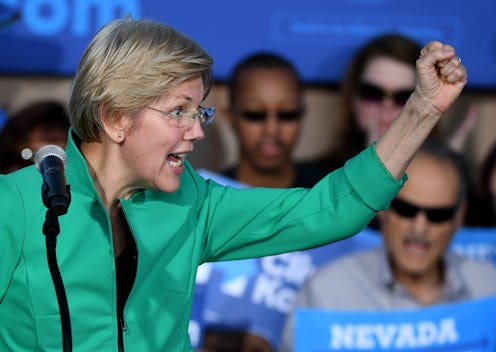News
"Nevertheless, She Persisted" Is A Feminist Chant

Women especially are used to being told to "talk less," so it's not really a surprise that outspoken Massachusetts Sen. Elizabeth Warren was silenced during a debate on the confirmation of Attorney General Jeff Sessions. But how was the "nevertheless, she persisted" incident repurposed as a feminist chant?
Part of it was probably Senate majority leader Mitch McConnell's grave rhetorical error — when he commented on Warren's silencing, he made his explanation catchy. "She was warned," McConnell said on the Senate floor. "She was given an explanation. Nevertheless, she persisted."
Warren's "persistence" was in continuing to read a letter written by Coretta Scott King, an iconic civil rights leader and Martin Luther King Jr.'s widow, against Sessions' nomination as a federal judge. (And indeed Sessions was later denied the federal judge position in part due to allegations of racially discriminatory statements, which he firmly denied.) But when she got to the part of the letter criticizing Sessions, McConnell stepped in to silence her by using the obscure Senate rule 19, which basically says senators aren't allowed to attribute to other senators "any conduct or motive unworthy or unbecoming a senator."
Feminists rallied behind Warren, with the hashtags #ShePersisted and #LetLizSpeak going viral.
And McConnell made the situation even more of a feminist rallying point by allowing other Democratic senators, including Bernie Sanders, Tom Udall, and Sherrod Brown, to read the same letter without being stopped. Somehow their persistence wasn't a problem. But when a woman spoke up, however, it was. In fact, one of the reasons Warren was silenced was for "ignoring warnings about being silenced," Republican aides reportedly told NBC News. In other words, Warren stood up to threats against her freedom of speech, and was punished for this by having her speaking rights revoked.
It's interesting that McConnell framed Warren's persistence as a negative thing, when that same trait is often rewarded in men. Let's take President Donald Trump for example. Despite constant obstacles to his being elected, Trump persisted throughout his campaign. Nothing could cause him to drop out — not his mocking of a disabled reporter, which he denies having done, not the various insults he threw at his opponents ("nasty woman," for instance), and no, not even the Access Hollywood hot mic tape leak where he bragged about being able to "grab them by the pussy" without permission. Trump denied ever acting on it.
Somehow Warren's reading a letter from a well-known civil rights activist was more of an issue to Republican senators than any of the controversies associated with Trump. And it's possible that King's letter wasn't even the problem; rather it could have been the fact that it was Warren — a woman —who was reading it. After all, if the letter itself was such a problem, McConnell would have silenced Sanders and the other men who read it on the Senate floor.
At the very least, Warren's silencing opened up a whole conversation about sexism and the way strong women are meant with such resistance from men. It also led to people, like Sen. Kamala Harris, using social media to honor other tenacious women who stood up for causes, such as Rosa Parks and former Sen. Wendy Davis. And while Warren may not have been able to speak during the Senate debate, she's clearly still using her voice otherwise — and she's not giving up on making sure as many people as possible read King's letter. In the meantime, "nevertheless, she persisted" will continue to inspire women across the country to keep pushing forward, regardless of the obstacles they may face.